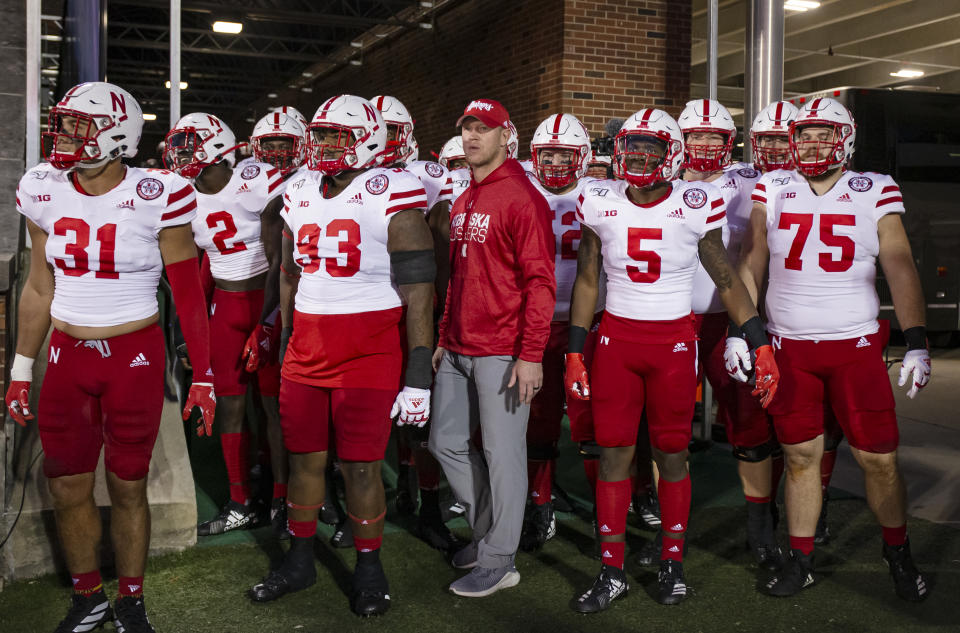Nebraska's Big Ten revolt was a good ploy despite its failure
In the end, all the saber rattling out of Nebraska ended with the modern equivalent of a whimper – a bland administrative statement that effectively waved the white flag on the Cornhuskers going rogue and playing football this fall ... or even bailing on the Big Ten altogether.
“The University of Nebraska-Lincoln is a fully committed member of the Big Ten Conference,” the school said in a statement. “It is an unparalleled athletic and academic alliance.
“We have the greatest fans in college athletics. This has been a difficult and disappointing week. We all look forward to the day where we can cheer on our student-athletes, on the field and in the arena.”
This was all predicted because it was predictable. Money. Media rights. Lawsuits. And that's before Big Ten commissioner Kevin Warren told Yahoo Sports that Nebraska wouldn’t be playing anywhere this fall “and be a member of the Big Ten Conference.”
The Huskers were part of (but certainly not alone) an unusually messy dispute for the button-down 125-year-old league. It ended as it always does though, with everyone falling in line.
That doesn’t mean it was an exercise in complete futility for the Huskers.
Nebraska made its point – to its fans, to its players and to potential recruits. The message was clear: It desperately wanted to play, the program is a very big deal in its state and it is willing to tilt some windmills to fight for what it believes in.

If nothing else, it got everyone talking about Big Red, which doesn't happen much these days.
It’s going to be painful for everyone in the conference if college football is played elsewhere this season. There is no avoiding that. For Nebraska, it will be particularly rough if the Big 12, its old league, gives it a go. There is no guarantee that will happen.
And if it does, at least Nebraska reminded everyone how much money it is making in the Big Ten (about $54 million per year, or about $15 million more than the Big 12 average). In a bad situation, it’s something.
Most intriguing, though, Nebraska is the new villain of its new conference, one that the establishment can mock and root against. The Big Ten offered Nebraska a lifeline in 2011, during conference realignment, when infighting made it look like the Big 12 could dissolve.
The Huskers have rewarded the Big Ten with a mediocre (and getting worse) on-field product and now ... this?
Ohio State complaining is one thing. Nebraska? At least Rutgers and Maryland knew their place.
This, however, could be a good thing. It’s at least a thing, which is better than being ignored or forgotten.
Lately, Nebraska had become just a date on the schedule. Schools that struggle to sell tickets (Illinois, Indiana, etc.) liked them because the Big Red traveling army of fans would fill the stands and parking lots. The league’s traditional powers, meanwhile, got an aging brand they could beat handily.
Since joining the league, Nebraska is 7-16 overall against Ohio State, Michigan, Penn State and Wisconsin, but hasn’t beaten any of them since 2013. Meanwhile, it has lost five consecutive to Iowa.
You wouldn’t think a black hat would fit for a program famous for such niceties as cheering the visiting team after games and releasing bright balloons after the first Husker score.
Yet, here we are. Maybe an unexpected identity is better than none.
In some ways, it fits. Nebraska is a state that rewards individualism. Lots of windswept plains where you fend for yourself, not the suburbs of Chicago or Columbus. Just going along with the plan might not make sense.
And Frost isn’t the kind of guy who backs down. Ever. He’s a small-town product who eventually quarterbacked Nebraska to a 13-0 national championship in 1997. As a coach, he led UCF to a perfect season in 2018 before returning home where the reclamation project has been slow (9-15 overall).
His vehement argument to play this fall drew lots of coverage. It changed zero minds in the conference, but it no doubt found some sympathetic ears among high school coaches, recruits and parents across the Midwest, if not elsewhere.
It was an oddball marketing effort. Yet a needed one. Stuck on the league’s far western fringe, no longer with the kind of access to Texas high school talent that the Big 12 provided, Nebraska was always a dicey proposition as a Big Ten member. The money was guaranteed in the Big Ten. Success certainly wasn’t.
Almost all the best recruits in the league footprint reside from Chicago and east. That leaves the Huskers fighting a long way from home in the backyard of lots of other brand-name programs with tradition and big stadiums (including independent Notre Dame). It’s uphill sledding.
Nebraska usually finishes fourth or fifth in Big Ten recruiting per Rivals.com and between 20-25 nationally. Not bad, but not good enough. Since joining the league, 39 five-star recruits have signed with Big Ten schools. None with Nebraska.
Maybe making its voice heard helps. It probably can’t hurt. The league office might not be too happy with the Huskers now and rival fans might be laughing at it, but for Scott Frost and the program, some kind of spark, some kind of narrative change was needed.
Issuing surrender statements isn’t an enjoyable experience. At least Nebraska fought because being nice and losing games isn’t much fun either.
More from Yahoo Sports:

